A Validity Study of the Mini-Cog Test in Thai Dementia Patients
Keywords:
Mini-mental state examination, MMSE, Mini-Cog, Thai dementia patientsAbstract
Objectives: To study a validity of the Mini-Cog test by comparing to mini-mental state examination (MMSE) for screening and diagnosing dementia in memory clinic at Ramathibodi hospital.
Method: The tests were conducted at memory clinic of Ramathibodi hospital between July 2005 and May 2010. They were carried out with 81 dementia patients and control group of 123 persons whose ages are 50 years old or greater. The data were collected through 3-item recall test and clock-drawing test form the medical charts whereas their interpretations were based on two Mini-Cog test algorithms and then compared with those of MMSE-Thai 2002 medical charts. Sensitivity and specificity for diagnosing dementia were also analyzed by comparing to gold standard, which is the diagnosing from consensus between psychiatrists
Results: The first Mini-Cog test returned 66.7% of sensitivity and 98.4% of specificity. The other Mini-Cog test algorithm have sensitivity and specificity for diagnosing dementia 72.8% and 97.6%, respectively. The MMSE-Thai 2002 in elementary school groups have sensitivity and specificity for diagnosing dementia 50% and 100%, respectively and in higher-then elementary school groups have sensitivity and specificity for diagnosing dementia 57.9% and 100%, respectively.
Conclusions: The Mini-Cog test is a useful tool for diagnosing dementia with high specificity and acceptable sensitivity. However, it should be used in correlation with clinical signs and symptoms. The advantages of this tool include its short time for administration, limited effects from level of education and verbal ability of examinees, simplicity to learn and apply.
References
Ferri CP, Prince M, Brayne C, Brodaty H, Fratiglioni L, Ganguli M, et al. Global prevalence of dementia: a Delphi consensus study. Lancet. 2005;366(9503):2112-7. doi:10.1016/S0140-6736(05)67889-0.
Jitapunkul S, Kunanusont C, Phoolcharoen W, Suriyawongpaisal P. Prevalence estimation of dementia among Thai elderly: a national survey. J Med Assoc Thai. 2001;84(4):461-7.
Jitapunkul S, Chansirikanjana S, Thamarpirat J. Undiagnosed dementia and value of serial cognitive impairment screening in developing countries: a population-based study. Geriatr Gerontol Int. 2009;9(1):47-53. doi:10.1111/j.1447-0594.2008.00501.x.
Kalaria RN, Maestre GE, Arizaga R, Friedland RP, Galasko D, Hall K, et al. Alzheimer's disease and vascular dementia in developing countries: prevalence, management, and risk factors. Lancet Neurol. 2008;7(9):812-26. doi:10.1016/S1474-4422(08)70169-8.
Weimer DL, Sager MA. Early identification and treatment of Alzheimer's disease: social and fiscal outcomes. Alzheimers Dement. 2009;5(3):215-26. doi:10.1016/j.jalz.2009.01.028.
Folstein MF, Folstein SE, McHugh PR. "Mini-mental state". A practical method for grading the cognitive state of patients for the clinician. J Psychiatr Res. 1975;12(3):189-98. doi:10.1016/0022-3956(75)90026-6.
Tombaugh TN, McIntyre NJ. The mini-mental state examination: a comprehensive review. J Am Geriatr Soc. 1992;40(9):922-35. doi:10.1111/j.1532-5415.1992.tb01992.x.
Cullen B, O'Neill B, Evans JJ, Coen RF, Lawlor BA. A review of screening tests for cognitive impairment. J Neurol Neurosurg Psychiatry. 2007;78(8):790-9. doi:10.1136/jnnp.2006.095414.
Woodford HJ, George J. Cognitive assessment in the elderly: a review of clinical methods. QJM. 2007;100(8):469-84. doi:10.1093/qjmed/hcm051.
Borson S, Scanlan J, Brush M, Vitaliano P, Dokmak A. The mini-cog: a cognitive 'vital signs' measure for dementia screening in multi-lingual elderly. Int J Geriatr Psychiatry. 2000;15(11):1021-7.
Borson S, Scanlan JM, Watanabe J, Tu SP, Lessig M. Simplifying detection of cognitive impairment: comparison of the Mini-Cog and Mini-Mental State Examination in a multiethnic sample. J Am Geriatr Soc. 2005;53(5):871-4. doi:10.1111/j.1532-5415.2005.53269.x.
Borson S, Scanlan JM, Chen P, Ganguli M. The Mini-Cog as a screen for dementia: validation in a population-based sample. J Am Geriatr Soc. 2003;51(10):1451-4. doi:10.1046/j.1532-5415.2003.51465.x.
Institute Of Geriatric Medicine. Mini-Mental State Examination: MMSE-Thai Version 2002. Bangkok: Department of Medical Services, Ministry of Public Health; 2004. (in Thai)
American Psychiatric Association. Diagnostic and Statistical Manual of Mental Disorders. 4th ed. (Text Revision). Washington, DC: American Psychiatric Association; 2000.













